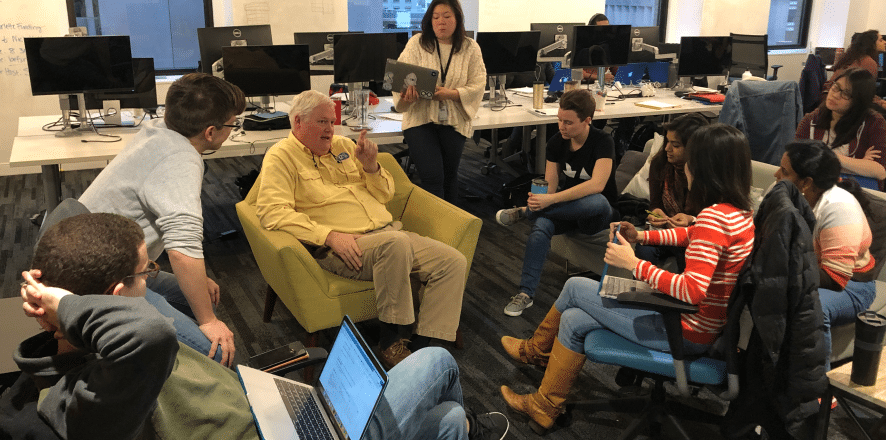Delaware native Leon Hunter is an instructor at Zip Code Wilmington. He’s served in this role since April, but his history with the school goes back further. A friend of his attended the bootcamp and was struggling with an assignment. The friend reached out to Leon, a professional software developer, for help. Leon was glad to assist. What Leon remembered most from that experience, however, was the feeling inside Zip Code Wilmington. Leon recalls, “I really liked the environment. Even though my background is in tech, I had not witnessed the Delaware tech scene in person. For me to finally see the community here at home made me want to keep coming here even after my friend graduated from the bootcamp.” This Q&A with Leon dives deeper into his experience as a Zip Code Wilmington instructor and what he hopes to pass on to his students.
Q: What appealed to you most about Zip Code Wilmington?
For me, one of the best things about Zip Code Wilmington is the culture. There’s a big difference between the culture here and what people typically associate with a coding bootcamp. As we interview students for admission, we don’t select students for their technical background. They are selected based on a number of criteria, including their natural logic and analytical skills and teamwork and communication skills. If you possess those skills, the sky’s the limit for you in the tech field. You can’t thrive as a coder all on your own. You have to rely on team members and you have to be able to communicate effectively with them. Yes, Zip Code Wilmington graduates are technically skilled, but in addition to that, they also have great communication skills and are team players.
Q: One benefit of attending the Zip Code Wilmington bootcamp is learning from experienced coding professionals. Tell us a bit about your professional expertise.
My whole life has revolved around tech. In high school, I studied graphic design, which focused on contrast, repetition, alignment, proximity, and scaling. Those things align perfectly with computer programming. In college, I took more coding classes than I needed, and I also tutored students from my sophomore through senior years. I also had two undergraduate research opportunities. One was in computational spectroscopy field (think smart lasers). The other was in bioinformatics, which takes biological principles and applies them to computing. I interned with Discover Finance in my junior year where I worked on Quality Assurance and with Visual Basic. I also dabbled in 2-D and 3-D game design and 3-D asset rendering.
Each Zip Code Wilmington instructor comes from a completely different background. We’ve all dedicated ourselves to tech and learning. The fact that we come from such diverse backgrounds shows the ubiquity of coding and how applicable it is in so many fields.
Q: What should students expect from the Zip Code Wilmington bootcamp?
They should fully understand the amount of time they’ll be investing. I always tell prospective students to expect to be doing at least 80 hours per week, for 3 months straight. At first, that scares people, but I then remind them we have a 96% job placement within 6 months of graduation. The average student arrives at our bootcamp making about $30,000 annually, after Zip Code, our placed grads earn an average of $63,000 per year. The time commitment can be stressful for students, and even the instructors, but it’s well worth it. It’s a lot of hard work, but when they leave here, they will be technically proficient coders.
Q: Besides coding skills, what else do you hope to pass on to your students?
In coding, there are certain philosophies that become second nature. We teach these things in the bootcamp: Beautiful is better than ugly, explicit is better than implicit, simple is better than complex, complex is better than complicated, flat is better than nested. We instill these lessons in the students, but these philosophies apply every day, not just to coding but to every problem that you try to solve.
Coding helps you change your perspective. The ability to think critically applies across all fields of science. There’s a student here with a PhD in chemistry. From time to time, I’ll talk to him about computational chemistry, not because I’m familiar with chemistry but because many principles in chemistry (like electron shells and atomic orbitals) can be programmatically expressed. I’m more interested in the problem solving algorithmic task of it. That problem solving ability that you learn as a coder applies to everything.
